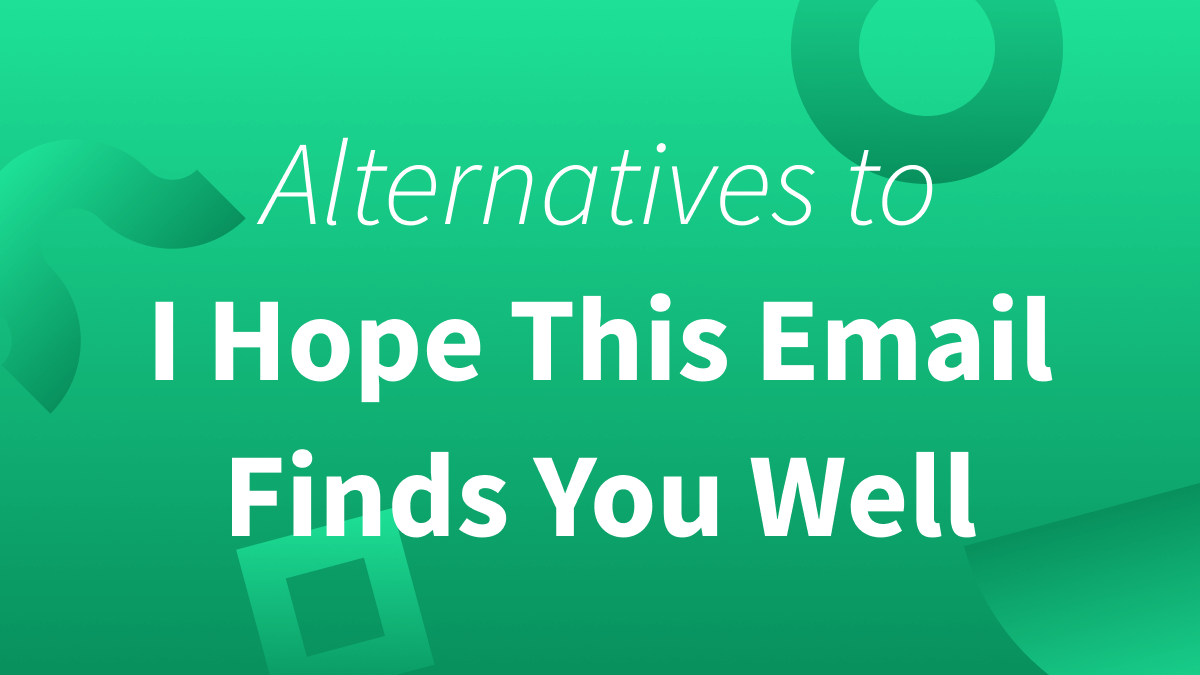Quick Summary on “I Hope This Email Finds You Well” Alternatives
- I hope this email finds you well is a phrase that is used at the beginning of formal emails. The problem with it is that it is unoriginal, overused, and inauthentic. Formal alternatives you could use instead are:
- Another option is to jump straight to the point of your email.
- ○ I know you’re busy, so I’ll be brief.
- ○ I hope you’re having a productive week.
- ○ It’s a pleasure connecting with you again.
- ○ I hope you’re doing well [+ add personal touch].
What’s Wrong With “I Hope This Email Finds You Well”?
I hope this email finds you well is a common email phrase. The issue with using it is that it’s so formulaic, that it can inadvertently result in you sounding insincere. Luckily, there are alternatives you can use instead. We’ll list them below and provide examples.

Five Formal Alternatives to “I Hope This Email Finds You Well”
We understand why you’re looking for a synonymous expression for this overused email cliché. Starting a formal email with an opener is a formality that many people prefer to include. But if you want to switch things up, try using any of the following alternatives.
1. I know you’re busy, so I’ll be brief.
This is an ideal opening to a formal email. It lets the recipient know that you value their time. Plus, they can expect the email to be short, and therefore there’s more of a chance that they’ll read it right away.
John,
I know you’re busy, so I’ll be brief. I wanted to inform you that the estimates have been approved, and you can proceed with the sale. Please let me know if you need any further details.
A colon after I know you’re busy, so I’ll be brief is also acceptable.
2. I hope you’re having a productive week.
This alternative is a polite expression you can use to start an email. It’s best to use this phrase with colleagues and coworkers, and not with your boss, supervisor, or any other superior.
Hello Sid,
I hope you’re having a productive week. Just so you’re aware, the luncheon has been rescheduled from Thursday at 12 PM to Friday at 1 PM. Please let me know if you have any questions.
3. It’s a pleasure connecting with you again.
This alternative for I hope you’re doing well can be used when you’re writing an email to someone you haven’t spoken to in a considerable amount of time.
Hi Corbin,
It’s a pleasure connecting with you again. When we worked together on the Cornell project, you said you’d love to work on a more community-based project. I have an opportunity for you that you might like. Please let me know if you’re interested and would like more details.
4. I hope you’re doing well [+ add personal touch].
Admittedly, this alternative is not too different from I hope this email finds you well. However, it’s slightly reworded. What’s most important is that you add a personal touch. This removes the inauthenticity from the original phrase.
Good morning Anastasia,
I hope you’re doing well and have fully recovered from the flu. The team and I have started a new project, and I’d like to fill you in on the details. Please let me know when you’re available for a meeting.
5. Remove it completely (and jump straight to the point of your email)
Don’t underestimate how busy people are in today’s age. Even reading an unnecessary opening email phrase shaves off valuable seconds from people’s day, as intense as that may sound. Many people appreciate short and direct communication.
Dear Mr. Dowling,
As requested, I’m writing to update you on the progress of the construction. First and foremost, the budget has been adhered to and the team has remained on schedule. No delays are expected.
Remember
Regardless of which alternative you use, the first letter of a sentence after a formal salutation should always be capitalized.
I Hope This Email Has No Errors
Now you have five formal alternatives you can use in place of the overused I hope this email finds you well. Another important aspect of writing formal emails is proper spelling and grammar. Using one of these alternatives won’t distract the recipient from an email filled with typos and errors.
To ensure flawless and professional writing that wows your bosses and coworkers, use LanguageTool as your spelling and grammar checker. This multilingual text editor can check for all types of mistakes, provide synonyms, and rephrase overused email phrases.

